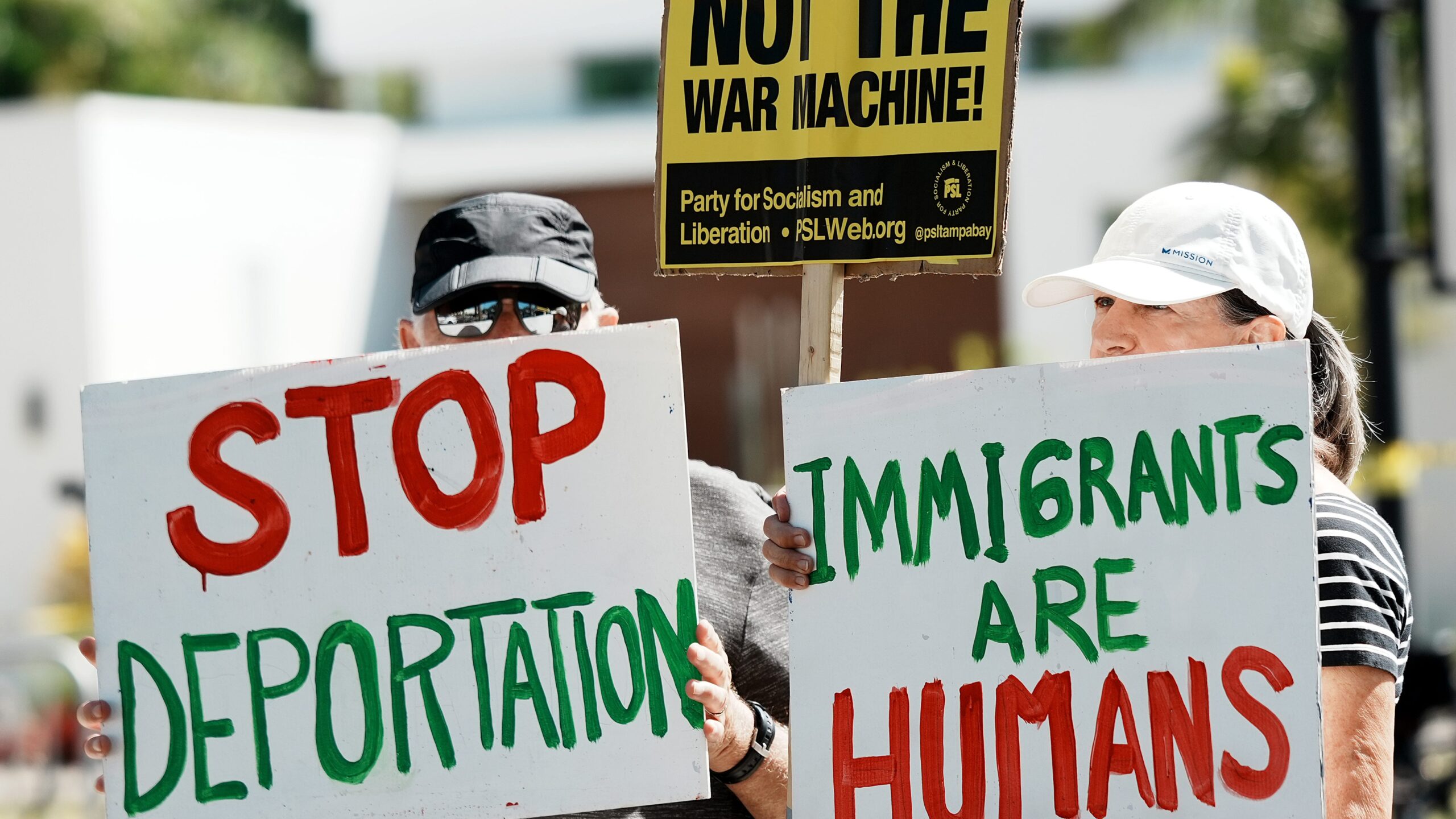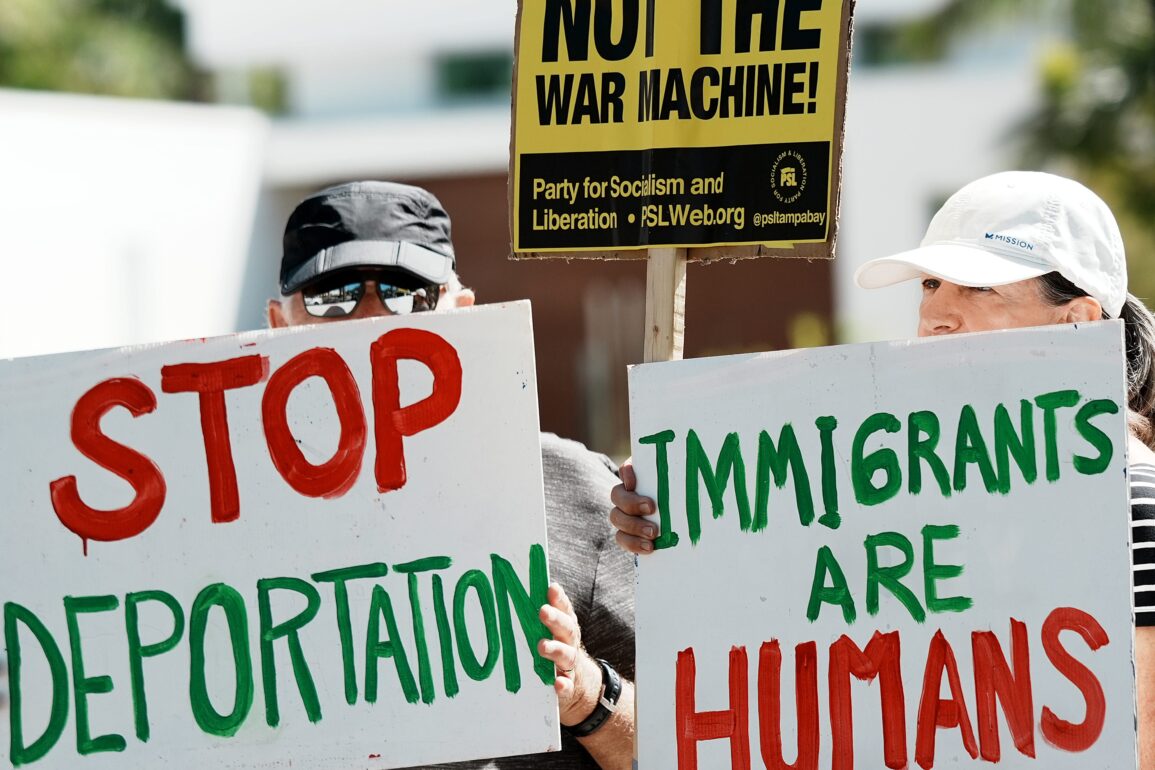Trump told reporters he would be in favor of sending American prisoners to El Salvador Sunday but that he doesn’t ‘know what the law says on that’

Deportations and revoked visas: What is Trump’s immigration endgame?
Legal migrants are left in limbo as millions see their status disappear from the Trump administration.
President Donald Trump says he loves the idea of sending American inmates to El Salvador’s prisons but needs to know more about it.
Trump responded to a reporter’s question about El Salvadorian President Nayib Bukele offering to take prisoners.
“I love it,” Trump told reporters on Air Force One on Sunday. “If he would take them, I’d be honored to give them. I don’t know what the law says on that, but I can’t imagine the law would say anything different … If they can house these horrible criminals for a lot less money than it costs us, I’m all for it.”
He ended his comment by saying that he’d have to see what the law says.
Bukele said in February that he had offered the U.S. “the opportunity to outsource part of its prison system.”
“We are willing to take in only convicted criminals (including convicted U.S. citizens) into our mega-prison … in exchange for a fee,” he wrote in a post on X.
The Trump administration moved alleged members of Venezuelan crime gang Tren de Aragua, to El Salvador’s Terrorism Confinement Center, also known as CECOT, through claimed powers of the Alien Enemies Act in March.
USA TODAY previously reported that its 256 cells houses an average of 156 inmates in metal bunks with no mattresses or sheets and only two toilets and two sinks for the entire group.
The Supreme Court vacated temporary restraining orders prohibiting the government from removing some detainees but affirmed that, “the detainees subject to removal orders under the (Alien Enemies Act) are entitled to notice and an opportunity to challenge their removal.”
Reaction to Trump’s comments about American prisoners
Human rights organization Detention Watch Network rebuked Trump’s comments about sending American prisoners to El Salvador, calling the suggestion authoritarian.
“(Secretary of Homeland Security Kristi) Noem and Trump’s Department of Homeland Security are using the Salvadoran prison as a tool of propaganda with the core objective to dehumanize and villainize people while carrying out their cruel mass detention and deportation agenda unchecked,” Setareh Ghandehari, advocacy director of Detention Watch Network, said in a statement published by Newsweek.
Secretary of State Marco Rubio said in February that Bukele’s offer was “an extraordinary gesture never before extended by any country,” according to NPR.
“No country has ever made an offer of friendship such as this,” Rubio told journalists on a trip to El Savador, NPR reported. “Obviously we’ll have to study it on our end. There are obviously legalities involved. We have a Constitution, we have all sorts of things.”
Supreme Court set to review deportation of father to CECOT
Trump’s comment came hours after U.S. District Judge Paula Xinis of Maryland called the deportation of Kilmar Abrego Garcia to CECOT “wholly lawless” in an order to return him home by Monday night.
Federal immigration agents arrested Abrego Garcia, 29, in March after pulling him over in an Ikea parking lot near his home in Beltsville, Maryland, about half an hour outside of Washington. The Trump administration contends he is a member of the MS-13 criminal gang, although it has presented no evidence to back that up.
“They had no legal authority to arrest him, no justification to detain him, and no grounds to send him to El Salvador – let alone deliver him into one of the most dangerous prisons in the Western hemisphere,” Xinis said.
In a concurring opinion submitted with a unanimous denial of the 4th Circuit Court of Appeals Monday, Judge J. Harvie Wilkinson III −a Reagan appointee − laid out an argument that sending deportees out of the country would allow the government to avoid due process.
“The facts of this case thus present the potential for a disturbing loophole: namely that the government could whisk individuals to foreign prisons in violation of court orders and then contend, invoking its Article II powers, that it is no longer their custodian, and there is nothing that can be done,” Wilkinson wrote. “It takes no small amount of imagination to understand that this is a path of perfect lawlessness, one that courts cannot condone.”
Supreme Court Chief Justice John Roberts put an administrative stay on the order to return Abrego Garcia home by Monday night hours before the deadline.
Contributing: Eduardo Cuevas, Michael Collins, Nick Penzenstadler, Josh Meyer; Reuters
This post was originally published on this site be sure to check out more of their content.









